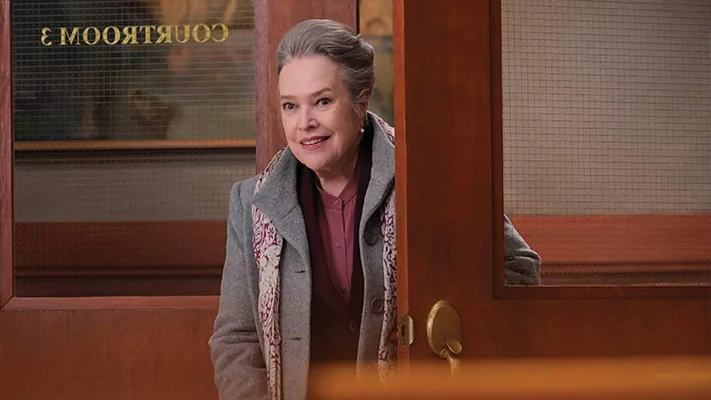
Here is what passes for metanarrative on CBS. The new Matlock “reimagining” of the classic 1984-1995 show, resuming Oct. 17 after its Sept. 22 “sneak peek,” takes place in a world in which the Andy Griffith original still aired. Booyah! Take that, Gramps and Gran! But wait, there’s more. The new series looks at the opioid crisis, #MeToo, and police misconduct, among other shopworn political concerns. If this baby were any more 2017, it would star Meghan Markle.
Instead, the series features Kathy Bates, now in her fourth decade of playing frumpy ladies of a certain age. In 1991’s Fried Green Tomatoes, Bates spoke for a generation when, wrecking two bimbos’ cherry-red Volkswagen, she declared herself “older” with “more insurance.” During a 2003 guest turn on Six Feet Under, her character justified a shoplifting spree on the pretext that “women our age are invisible.”

The crimes committed on Matlock are, as one might expect, considerably more serious. Yet behind the murdered prostitutes and sexually harassed bankers lies a scam that turns the old series on its head. In the pilot episode, professing once again that women become “damn near invisible” as they age, Bates’s Madeline (“Matty”) Matlock cons her way into the law offices of Manhattan’s Jacobson & Moore. As contrived during her impromptu job interview, Matty’s angle is to provide for her grandson after a 30-year hiatus from the profession. The actual score, however, is that someone at the firm hid documents that could have stopped the opioid business in its tracks. Having lost a daughter to addiction, Matty is out for revenge.
Like most episodic dramedies, Matlock keeps its fingers in two pies. On the one hand, individual clients must be serviced, a necessity that pairs Matty with winsome legal colleagues Billy (David Del Rio) and Sarah (Leah Lewis). On the other, the firm’s bigwigs must be spied upon and subverted. Chief among Matty’s suspects are the practice’s managing partner, Senior (Beau Bridges), and his grinning scion Julian (Jason Ritter). Or might the villain be Matty’s boss and rival, Olympia (Skye P. Marshall), whose hardened gaze suggests innumerable unsavory secrets?
All of the show’s actors are watchable, pleasant, and game. But it is surely no spoiler to reveal that the writing is godawful and the “situations” as wince-inducing as a car crash. Though I have seen only the six episodes screened for critics, I can hardly conceive of a stupider line than Olympia’s audience-despising avowal that “he-said, she-said cases are all about nuance.” (Tell us more, Madam Chief Justice.) Nor are future installments likely to do worse than an Episode 3 subplot in which Matty encounters the firm’s jury consultant, Shae (Yael Grobglas). Faced with this “master lie detector,” our heroine begins to simper and squirm as if liable to self-combust. The scene is ridiculous, annoying, and miles away from funny. Though the “notes” of network executives are famously unhelpful, couldn’t someone have flagged that horrifying exchange?
Sadly, Matlock’s contempt for its viewers’ intelligence may be the show’s primary characteristic. The exposition is artless and explicit. (“Tell me again about Plot Point X,” characters regularly implore each other.) An Episode 1 “reveal” is accompanied by flashbacks to scenes that aired literally 20 minutes earlier, as if we have somehow forgotten them. These are network-television sins, requiring network-viewer forgiveness. Yet I personally can’t imagine anyone who can tie his own shoes enjoying Matlock unironically.
It should be noted that CBS’s latest is not the sole offender of its kind. Indeed, the new series belongs to a lamentable 21st-century tradition of network rehashes and reinvestigations. Having suffered through reboots of Hawaii Five-0, Magnum P.I., and The Fresh Prince of Bel-Air, viewers might as well prepare themselves for a warmed-over Andy Griffith Show, starring, I don’t know, Chris Rock as Mayberry’s finest. The pilot practically writes itself. Backed into a corner by a police brutality charge, Barney Fife (a devastating Hayden Christensen) must navigate both Andy’s displeasure and a Community Oversight Board led by Aunt Bee (Ted Danson). Would I watch it? Actually, I might. That doesn’t mean, however, that it wouldn’t be a needless mockery of the still-streamable original. Matlock certainly is.
And yet, even I have to admit that the new series is not quite as awful as it could have been. Bates knows what she’s doing in front of a camera, and the production is surely lighter and more charming than whatever network abomination preceded it in the timeslot. (NCIS: Little Rock?) Perhaps the best description I can give is that the show is sweetly oblivious. It aims low, delivers, and then prances smilingly away, its hands in its pockets. Some television programs are badly made and mean-spirited. Matlock is only the former.
“Hurry up, each Matlock could be our last,” a fellow geezer implores Grandpa Simpson in a classic 1994 episode. Broadly speaking, however, he’s probably wrong, given TV culture’s near-pathological reliance on existing IP. Who will play the hoary-haired attorney when the series inevitably launches a third time in 2062? I don’t know. But thinking about the possibilities is enough to get one through at least the next commercial break.
CLICK HERE TO READ MORE FROM THE WASHINGTON EXAMINER
Graham Hillard is editor at the James G. Martin Center for Academic Renewal and a Washington Examiner magazine contributing writer.








